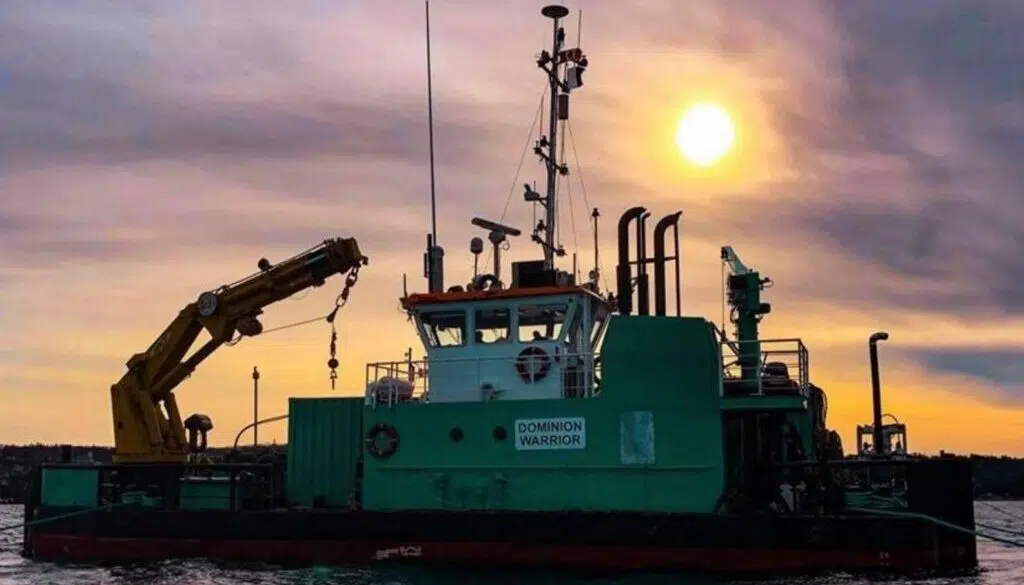
(SUBMITTED PHOTO)
When The MV Holiday Island ferry caught fire last Friday, firefighters from across P.E.I. rushed to put out the blaze. In the end, 200 people were safely evacuated. But when it came time to tow the damaged vessel back to port, authorities called a Halifax company with 53 years of adventurous experience.
Dominion Diving was using its tugboat, the Dominion Warrior, to tow a navy vessel from Halifax Harbour to the Pictou Shipyard on Friday. That is when the company got the call to help salvage the P.E.I. Ferry. Since the Warrior was travelling along the Eastern Shore, they were about 24 hours away from the MV Holiday Island. They agreed to take the job.
“The glove fit perfectly,” said Robin Lohnes, who co-owns Dominion Diving with his brother Matthew.
“It was extremely good timing. We continued our tow with the navy boat, then we proceeded to immediately head towards the ferry.”
Lohnes said while salvaging a damaged vessel is always tricky and comes with challenges, the Dominion Warrior is a vessel perfect for towing the ferry to port.
“The Vessel that we have, The Dominion Warrior, it’s an extremely unique vessel in North America. We imported that in 2018. And it kind of looks like an aircraft carrier,” said Lohnes.
“They’re very common in Europe; they were invented 30 years ago. But there was none in North America, including the United States. I came up with the idea we should have one of these things.”
The crew from Dominion Diving were able to overcome the challenges of salvaging the MV Holiday Islands thanks to the abilities of the Dominion Warrior, and its experienced crew.
“Whenever you’re dealing with salvage you’re dealing with shallow water. And you’re dealing with an expedited tow operation,” said Lohnes
“The ferry is a large vessel and there’s some complications to it. Luckily onboard the Warrior, we had one of our best captains, Herb. He’s been working for Dominion Diving for 45 years. He started out as a diver back in the early ’70s.”
It took the crew of the Dominion Warrior 12 hours to complete the salvage operation. It was another success in the long and storied history of Dominion Diving.
The company was started by Lohnes’ father, Barry, and his business partner Jim Ritcy in 1969. At first, the operation started off small.
“Dominion Diving started in my mother’s garage of our house that we lived in out in Westphal. She still lives in the same spot,” says Lohnes.
As the name of the company suggests, Dominion Diving can take a lot of jobs that require underwater work. But salvaging vessels, or parts of vessels, has long been a part of the company as well.
Lohnes says his father, in the early days, would salvage pieces of World War II wrecks that were scattered along the coast of Nova Scotia.
“There were a lot of wrecks from World War II that were along the coast they would salvage. They used to call it junkin’.”
“It’s a hard, hard job. It’s a feast or famine type thing.”
When asked what a routine salvage operation is like in modern times, Lohnes thought for a moment before revealing there is nothing routine about the work he and his brother takes on.
“There’s no such thing as a typical situation. Sometimes the vessels are sunk, sometimes they’re in distress. Sometimes we’ll go and make a repair.”
If you’ve ever seen a movie or TV show where a vessel is being salvaged, you may have a misunderstanding of how the business works. Take the plot of the horror movie Virus for example, where a crew on a tugboat finds a Russian scientific ship drifting in international waters. The captain, played by Donald Sutherland, says that they can simply claim salvage on the ship, and force the Russians to pay a percentage of the vessel’s worth to get it back.
But Lohnes says salvaging ships isn’t that lawless, even in international waters. And you can’t claim a vessel as your own just because you’re the first to find it abandoned in the ocean.
“That’s a myth, it doesn’t work like that. Marine law is very complicated. Normally you’re contracted by an insurance company or by an owner.”
When asked what salvage operation pops into mind when he looks back on his career, Lohnes says he recalls how Dominion Diving helped raised the Irving Whale.
The oil barge, which belongs to the Irvings, sunk while being towed through the Gulf of St Lawrence in stormy weather in 1970. There it sat for 26 years until environmental concerns caused the federal government to finally act. Dominion Diving did some underwater work, surveying and helped with the salvage.
“It was a high-profile wreck because it was full of oil and was a real hazard,” said Lohnes.
The salvage operation of the Irving Whale caused public anger. The final price tag for the federal government was $42-million of taxpayer money. In the end, the government agreed that the Irvings need only contribute $5-million in reimbursement.
Another high-profile salvage Dominion Diving worked on was on a ship called the Lake Carling. While crossing the Gulf of St. Lawrences, a minor crack in the hull grew into an enormous one.
“I was one of the divers that went out,” recalled Lohnes. “It had a 30-foot crack on one side and a 20-foot crack on the other. The crew had abandoned. We went there and welded up the cracks, pumped it out and towed it to Gas Bay.”
Dominion Diving does more than just salvage and send workers underwater, however. They also utilize the latest technology in underwater robotics (aka ROVs). That is the area of the business Matthew Lohnes oversees.
In part two of our story on Dominion Diving, Matthew Lohnes will reveal some of the amazing adventures he has been a part of thanks to his knowledge in this field. We will also hear more of the history of the company. Stay tuned.
Derek Montague is a Huddle reporter in Halifax. Send him your feedback and story ideas: montagued@huddle.today.



